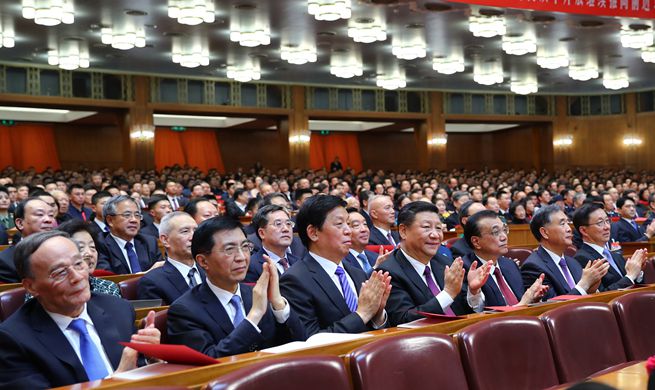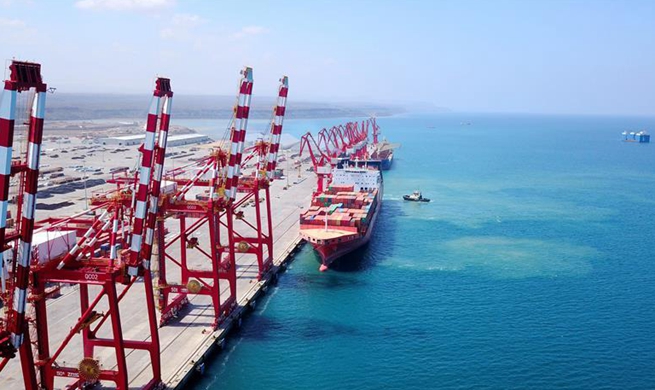GAZA, Dec. 14 (Xinhua) -- The current U.S. administration's policies have complicated the peace process between Palestinians and Israel in 2018, said Palestinian observers.
They say the administration of U.S. President Donald Trump is no longer a neutral peace mediator and is preventing other international sponsors as demanded by the Palestinians.
The Trump administration recognized Jerusalem as the capital of Israel and moved its embassy in May to the disputed city, which the Palestinians call its eastern part as the capital of their future state.
Trump also made a series of unprecedented decisions, such as the closure of the Palestine Liberation Organization (PLO) office in Washington and the cessation of financial support for Palestinians and the UN Relief and Works Agency for Palestine refugees (UNRWA).
To date, Washington has refrained from proposing its "peace plan" called "the deal of the century," as it had previously promised, a plan that has been rejected by the Palestinians before it sees the light.
Former Palestinian diplomat, Nabil Amr, said that the biggest mistake committed by the current U.S. administration is it moved, even theoretically, from being a mediator to be a party in the Palestinian-Israeli conflict.
"Washington policies led to the complexity and retreat of the peace process, preventing other countries from playing the role of neutral mediator and closing many doors to peacemaking," Amr told Xinhua.
"The Palestinian decisions regarding the suspension of recognition of Israel and the cessation of agreements with it are political and moral decisions, but on the ground, there are no signs to implement them," Amr pointed out.
Israel did not follow the signed agreements, Amr said, adding the Palestinian decisions represent a message to the world that the Palestinian situation is confused and dangerous and may lead to further field tension.
Meanwhile, Ghassan Khatib, a Ramallah-based professor of political science at Birzeit University, said the Palestinian leadership faces severe difficulties in taking dramatic decisions against Washington and Israel.
He added that the implementation of Palestinian decisions regarding the relationship with Israel could practically lead to the collapse of the Palestinian Authority, an option that does not enjoy a Palestinian consensus and a step that is not supported by the international community.
The professor believes that there is unlikely to be a close horizon to move seriously to resume the peace process in light of the Palestinian rejection of the positions of the Trump administration.
So far, the U.S. has not given any official details on the content of "the deal of the century," but Israeli reports have repeatedly said it would include the announcement of Abu Dis village in East Jerusalem as a Palestinian capital in return for an Israeli withdrawal from three or five Palestinian villages around Jerusalem.
According to Israeli reports, the deal will not include any proposals for an Israeli withdrawal from existing settlements or large settlement blocs.
The reports also said that the Palestinian Valley area will be kept under Israeli control with the establishment of a demilitarized Palestinian state without an army or heavy weapons.
The essence of the Palestinian position on the peace process focuses on a solution based on ending the Israeli occupation of the territories occupied in 1967.
It also focuses on the establishment of an independent Palestinian state in accordance with the principle of an internationally supported two-state solution after final status issues are resolved between the two sides.
However, Hani al-Masri, director of the Ramallah-based Masarat Center for Research and Studies, believes that Israel has no real desire to end its occupation of the Palestinian territories as it views it a "profitable occupation."
"As long as the occupation is not costly for Israel and its supporters, it will remain, especially after the signing of the Oslo Accord in 1993, which changed the nature of the conflict from a conflict between people partially displaced from their homeland into a dispute over land and borders," al-Masri said.
The Palestinian observer said Israel also wants the Palestinian Authority to continue since it removes many of the burdens of the occupation, which are funded by the international community instead of Israel.
Recently, Palestinian officials repeatedly warned of Israel's official approach to normalize relations with Arab countries over reaching a peaceful solution with the Palestinians.
Over the past months, Israeli Prime Minister Benjamin Netanyahu and his ministers held rare visits to Oman and Islamic African countries amid talk of significant progress in relations between the two sides.
Ahmed Rafiq Awad, political analyst from Ramallah, told Xinhua that the essence of Trump's plan is to integrate Israel into the Middle East at the expense of the Palestinian cause.
"This is dangerous for the Palestinian cause, because it halts efforts to solve the Palestinian-Israeli conflict and gives temporary humanitarian economic solutions, legitimizing the occupation and prolonging it," Awad said.

















